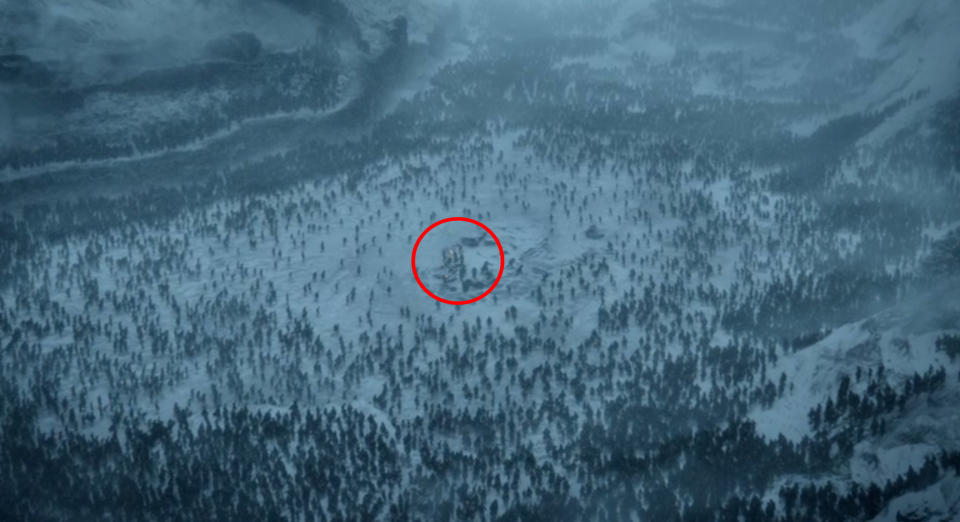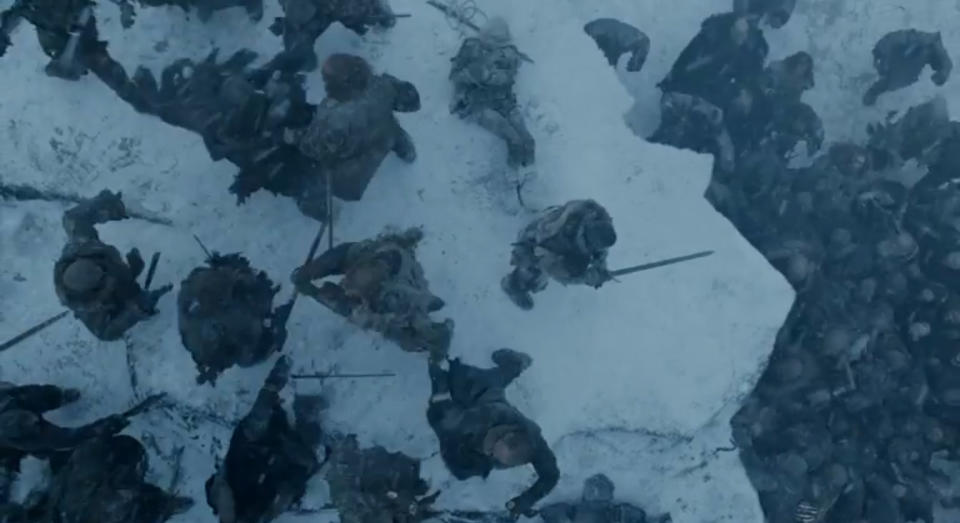A Major Twist Couldn't Save 'GoT' from Itself

Many a meme has surfaced in recent weeks to challenge the absurdity of Game of Thrones Season 7, from the pacing to its movement of characters across vast swaths of land in a short period of time. But this week's episode, "Beyond the Wall," forced stupid decisions on its characters and ignored all laws of time and space in favor of a thrilling narrative. The show is suffering as a result.
The episode was arguably doomed before it began, ever since Jon Snow declared his ill-advised intention to take a small band of men north of the Wall to kidnap a wight in last week's episode. It was a bad idea then - why wouldn't you just take the three dragons at your disposal and destroy the Army of the Dead for good? - and it was an even worse idea this week, when the group, trudging dutifully onward with little supplies (certainly not a sufficient amount of dragonglass, which Jon just spent several episodes praising for its ability to destroy White Walkers) found themselves face to face with a whole bunch of wights. How exactly did Jon think he was going to quietly snatch a zombie and hustle it back through the Wall without attracting the attention of the Night King? Of course, that's exactly what they did, and Jon's brilliant plan to save his men from certain death required sending Gendry on a marathon run back to Eastwatch.
This is the part of the episode where anything resembling a timeline melts into oblivion: as Jon and his men take refuge on an island in the middle of a half-frozen lake (reminder that Sansa just said this is the coldest winter in living memory minutes before), Gendry somehow makes it back to Eastwatch, gets a raven to Daenerys, and then she happens to know exactly where this battle is taking place, arriving just in time to save the men from their own stupidity.

But we're getting ahead of ourselves. As Dany rushes to save Jon's men, they're already starting to freeze to death (RIP Thoros of Myr). Several members of his group, many of whom have a lot more life and battle experience than Jon, suggest attempting to take out the Night King, and thus, destroy the Army of the Dead for good. But Jon declares their only hope lies in Dany, a person who might not even know there's any danger. He refuses to take any action that could jeopardize his ability to bring home a wight as proof of the White Walkers' existence, an uncharacteristically stubborn choice that puts his men at further risk. In fact, as the final battle rages around Jon (more on that in a bit), he keeps attempting to pull the wight to safety. When one of his nameless comrades tries to help, he loses his balance and falls to his death. There are thousands of wights surrounding them, but for some reason, Jon has to save this one. You've got blood on your hands, Jon Snow.
But that wasn't even the worst of it. First, the Hound made the incomprehensible decision to taunt the wights by whipping rocks at their heads, inadvertently alerting them that the ice had frozen over and they could safely cross it. A battle between the humans and wights ensues, but it's too far-fetched even for a show built on the backs of dragons and shadow babies. There's simply no way Jon and six other men held off thousands of wights, moving at a fairly brisk pace, for five full minutes.
Let's look at the evidence. If you're using HBO Go, the most dire moments of the battle begin at 47:11 with the first wight walking across the frozen lake, and end at 52:08, when Drogon bellows fire at the Army of the Dead.





This doesn't make sense.
Put simply, there is no explanation for Jon's inability to think this entire expedition through to its logical conclusion: certain death. Jon knows he's one of the few people capable of spreading awareness of the Army of the Dead and, ostensibly, saving Westeros from the threat of the White Walkers. Still, he chose to embark on what amounts to a suicide mission. After six seasons of watching him grow and learn as a character, this feels unbelievable. Jeor Mormont would scoff in disgust. Even Jon's near-death experience during last season's Battle of the Bastards - which cost his brother Rickon his life - should've been enough to convince Jon that acting without a sufficient plan can only spell disaster. And of course, it does: Jon's dozens of mistakes lead to the death of Daenerys's dragon Viserion. This sacrifice generates the only genuinely exciting moment in the episode: the final scene, where the Night King turns Viserion into an ice dragon, paving the way for mass chaos and death in the upcoming season finale.
Unfortunately, the decisions which led to this scene undermine what should have been a landmark cliffhanger for the show. Clearly, George R. R. Martin's Song of Ice and Fire series is headed toward the birth of the ice dragon, but the show's writers were unable to craft a compelling, believable narrative to lead to this moment. Yes, I know Game of Thrones is a fantasy series, but as I wrote about the show just a few weeks ago, "When the show's writers disregard their own rules, they undermine the believability of a fictional world viewers have spent dozens of hours embedding themselves within - and risk permanently damaging their suspension of disbelief." The GoT writers continue to flout the logic of the world they've spent more than six years crafting, and it's ruining the viewing experience of the show.
You Might Also Like

 Yahoo News
Yahoo News 
